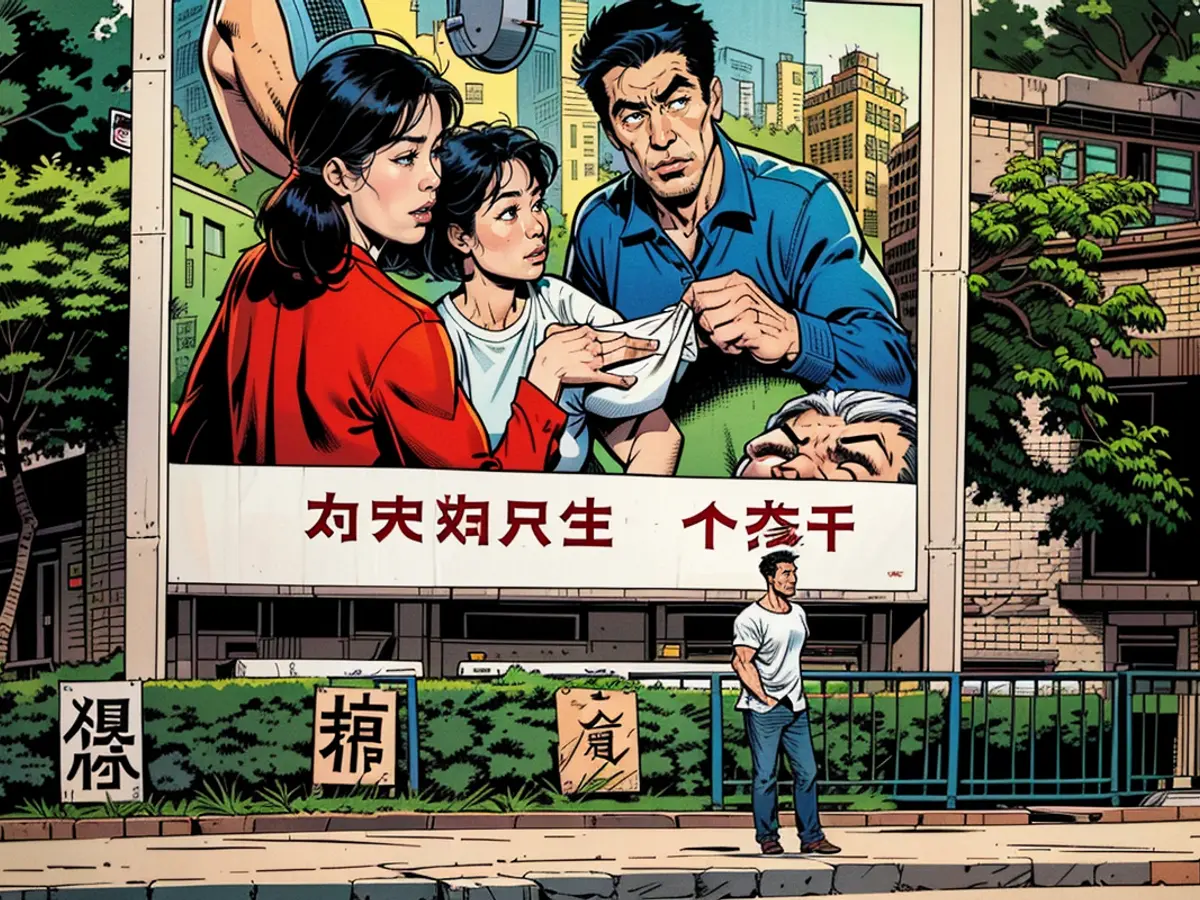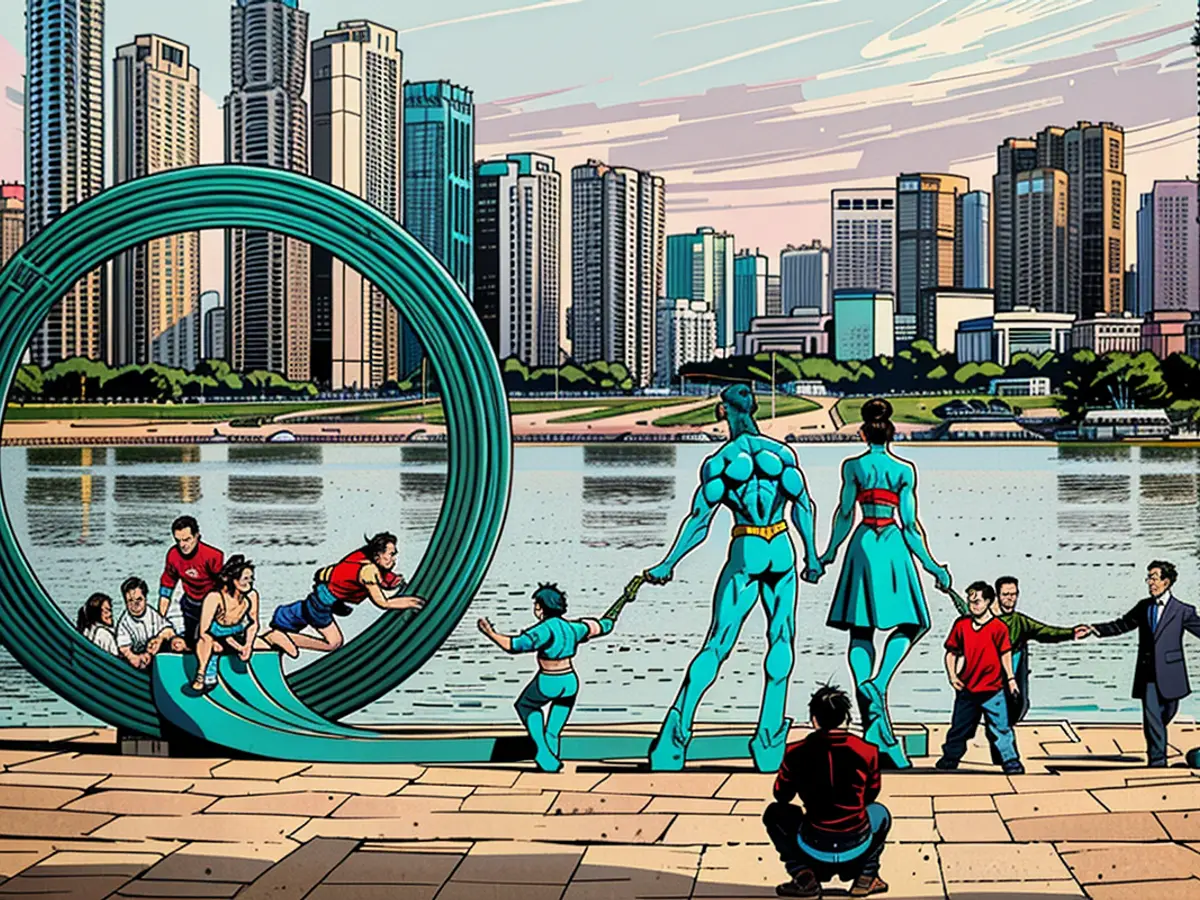China's legacy of the one-child policy: Neglected women reject Beijing's pro-natal initiative
Little Fang, a third grader, hesitated before responding to the teacher's simple inquiry, unaware that she was stuck between a rock and a hard place.
Ever since preschool, Fang had been unofficially recognized as her eldest uncle's daughter - a strategy adopted by her biological parents to avoid the severe penalties associated with having a second child under China's controversial one-child policy, which remained in effect from 1980 to 2015.
"I had no idea who my real parents were," Fang later told CNN, using a pseudonym for privacy reasons.
Post-2015, Beijing slowly lifted the birth limits from one to two children, then to three in 2021, as a means of addressing an impending demographic crisis.
The one-child policy has long been dismantled, yet the lingering scars of the past are yet to heal. New generations of women like Fang, who grew up under harsh circumstances due to the one-child policy, approach motherhood with trepidation, making Beijing's present pro-birth push an uphill battle.
Fang was born during the 1990s, when the one-child limit was at its strictest, and became an older sister just a year later due to her mother's "unauthorized" pregnancy. To avoid punishment, Fang was sent away to live with her relatives, while her mother acted as if she were carrying her first child.
At 30, Fang remains childless and attributes her decision to her own traumatic childhood experiences.
"All my fears, uncertainties, and insecurities from childhood have, to some extent, influenced my current stance," she shared.
The toll on eldest daughters
Keeping their firstborn a secret spared Fang's parents the heavy fines, job loss, and even forced abortions and sterilizations that were common consequences of having a second, unwanted child in China.
Fang was only permitted to return home at the age of 10, but she was still listed as her eldest uncle's daughter. She was instructed to stick to her official registration when asked about her parents.
Fang's parents attempted to have another child after the one-child policy was revoked in 2015, hoping for a son, but they only gave birth to another daughter.
Over three decades of China's one-child policy, an estimated 20 million baby girls were "lost" due to sex-selective abortions or infanticide, according to Li Shuzhuo, director of the Center for Population and Social Policy Research at China's Xi'an Jiaotong University.

Yao, the eldest of three siblings, endured a similar childhood scarred by the policy. Born in a rural village in Shandong, one of the 19 provinces that allowed rural families with a second child if their first was a girl during the single-child policy, Yao requested that CNN use only her surname for privacy reasons.
Her first sibling was a girl, as allowed under the policy, but then her mother became pregnant with a third child, a forbidden one. Yao was sent to live with her grandparents, and her mother had to hide her pregnancy to avoid a potential forced abortion. After the third child was born, she attempted to register him as her son but had to pay a significant fine of 50,000 yuan ($7,000).
"I missed my mother's company for nearly a year while she was pregnant with my younger brother," Yao recalled.
CNN is unable to verify Fang and Yao's accounts independently.
From one to three - or none?
Following the shift to a three-child policy in 2021, Beijing has launched campaigns to promote a "pro-birth culture," as China's population shrinks and ages rapidly.
Posters and slogans urging birth control have been replaced with ones encouraging more births, while local governments have rolled out various incentives, including cash rewards and housing subsidies.
The policy shift, from birth restrictions to birth encouragement, has left Yao and Fang "stunned."
"How ingenious the family planning policy is!" Yao joked skeptically. "They used to penalize us for having two, and now they expect us to have three?"
Fang holds a more critical stance on Beijing's initiatives to boost birth rates, arguing, "Whether or not to have children is a woman's personal choice, not a matter of policy, be it a stick or a carrot."
In May 2022, China's National Health Commission released a set of "birth-friendly theme posters," encouraging the widespread dissemination of these messages from social media to community parks. The move drew sarcastic comments on social media, referencing past slogans like "Fewer kids, happier lives."
Last year, the nation's average number of children born per woman during her reproductive years, known as the Total Fertility Rate (TFR), was around 1.0, according to data from the 2024 China Birth Report by the YuWa Population Research Institute, a Chinese think tank. This is significantly lower than the 2.1 rate required to maintain a stable population and is the second lowest among major world economies.

The birth deficit is even more pronounced in Shanghai, where roughly half of women don't have children during their reproductive periods, as indicated by the city's 2023 TFR figure of 0.6.
China confronts three major obstacles to reversing its declining population, as noted by Yi Fuxian, a demographics expert at the University of Wisconsin. These obstacles include low fertility desire, high child-rearing costs, and rising infertility rates. Yi believes that only the affordability issue can be addressed by the government.
In response, the Communist Party proposed increasing incentives such as childbirth subsidies and more affordable childcare at its recent leadership meeting. However, debt-ridden local governments, struggling with pandemic control measures and a real estate market crash, can only implement these incentives on a limited budget, making the party's birth enhancement plans unlikely to succeed.
According to Jiemian, the highest childcare subsidies nationwide amount to 57,800 yuan (approximately $8,000), a minimal amount in one of the world's most expensive countries for child-rearing. The cost of raising a child to 18 in China is 6.3 times its GDP per capita, making it the second most expensive in the world, after South Korea.
As a result, some people postpone parenthood until later in life, when their fertility and inclination towards child-rearing may be diminished. Yi warns that China has fallen into a "low-fertility trap" and the figure will continue to decrease.
A low-fertility trap refers to a self-reinforcing cycle: low fertility rates lead to population aging and economic stagnation, which further discourages childbearing, creating a downward spiral.
Yi considers China's shrinking population a natural phenomenon, a giant rock gradually rolling down a hillside, but the one-child policy abruptly forced the rock off the cliff, making it extremely difficult to reverse.
Online discussions in China about childbearing decisions largely revolve around financial concerns, but some critics also point out the negative impact of the one-child policy by sharing old birth fines receipts on Xiaohongshu. Lu Pin, a Chinese feminist, argues that coercive family planning is a form of state violence that has left lasting scars on many women.
Forced abortions and sterilizations, aspects of China's one-child policy, have caused physical and mental trauma for hundreds of millions of women. Between 1980 and 2014, 324 million Chinese women were fitted with intrauterine devices and 107 million underwent tubal ligations to prevent pregnancy. Those contraceptive devices, intended for use between 5 to 20 years, have been in use for much longer due to a lack of timely removal by family planning officials.
Yi and Lu Pin both express frustration with Beijing's unwillingness to acknowledge or reflect on the trauma caused by the one-child policy. Lu Pin believes it is improbable that women will soon forget this painful history and eagerly embrace birth incentives.
CNN’s Jessie Yeung, Nectar Gan and Simone McCarthy contributed to this story.
After the one-child policy was implemented in China in 1980, the world watched as the country implemented strict birth control measures, resulting in a significant population imbalance with more men than women.
Despite the relaxation of birth limits in 2021, allowing families to have up to three children, the deep scars left by the one-child policy continue to impact women like Fang and Yao, who were born during this period of strict population control.








